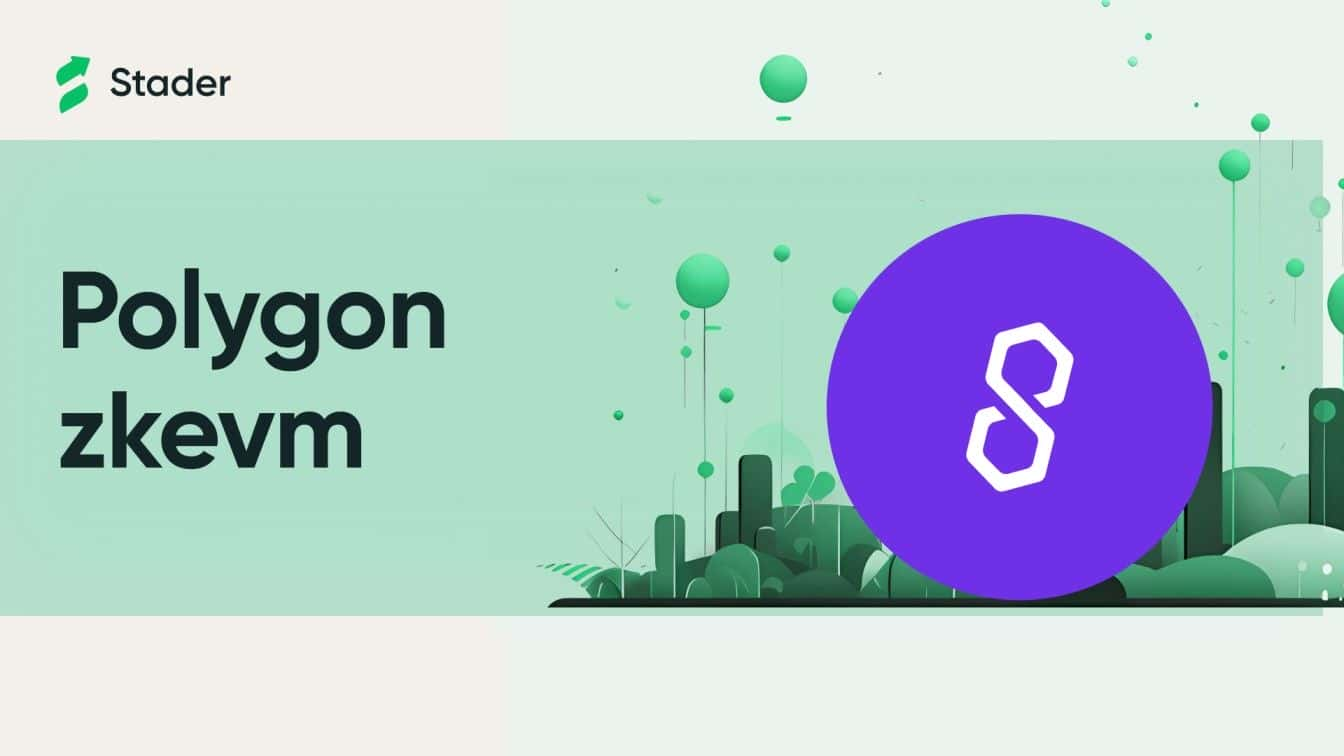What is Polygon zkEVM?
Home
Blogs
Staking Basics
What is Polygon...

What is Polygon zkEVM?
Polygon zkEVM, an L-2 scaling solution for Ethereum that uses zero-knowledge proofs (ZKPs) to achieve high throughput and lower gas fees. It is designed to be fully compatible with the EVM so that developers could easily port their existing Ethereum dapps to Polygon zkEVM.
ZKPs allow two parties to verify the correctness of a computation without revealing the underlying data making them an ideal solution for scaling blockchains, as it allows the transactions to be verified off-chain, which can significantly reduce the amount of traffic on the main chain.
Polygon zkEVM is still under development, but it can be a major breakthrough in blockchain scalability. It allows Ethereum to support a much higher volume of transactions without compromising on the security or decentralized nature of the network.
How Does Polygon zKEVM work?
Polygon zkEVM works by using zero-knowledge proofs to verify the correctness of transactions off-chain which allows zkEVM to achieve high throughput and low gas fees, while still maintaining the security of Ethereum L1.
Here is a simplified overview of how Polygon zkEVM works:
- Users process transactions to a Polygon zkEVM node.
- The node batches the transactions together and generates a ZKP for the batch.
- The node sends the batch and the ZKP to the Ethereum Layer 1.
- Ethereum L1 verifies the ZKP and updates its status accordingly.
Polygon Use Cases
Here are some of the potential use cases for Polygon zkEVM:
Decentralized finance (DeFi): Polygon zkEVM could be used for a wide range of DeFi applications, such as lending, borrowing, and trading. Higher throughput and lower gas fees of Polygon zkEVM makes it ideal for these applications, as they would be able to process a large number of transactions quickly and cheaply.
Non-fungible tokens (NFTs): Polygon zkEVM could be used to create and trade NFTs.
Gaming: Polygon zkEVM could power blockchain games.The users won’t need to worry about high transaction fees with zkEVM.
Enterprise applications: Polygon zkEVM could be used for a variety of enterprising applications, such as supply chain management, identity management, and voting as Polygon zkEVM would be able to process a large number of transactions quickly and cheaply.
How Polygon zKEVM reduces cost
Batching: By batching transactions together, Polygon zkEVM can reduce the amount of data that needs to be verified on Ethereum L1. This reduces the computational cost of verification, which in turn reduces the gas fees.
Zero-knowledge proofs: Zero-knowledge proofs allow Polygon zkEVM to verify the correctness of transactions without revealing the underlying data. This means that the Ethereum L1 does not need to see the full details of each transaction, which further reduces the computational cost of verification.
Off-chain verification: By verifying transactions off-chain, Polygon zkEVM can reduce the load on the Ethereum L1. This frees up the Ethereum L1 to process other transactions, which in turn helps to keep gas fees low.
Pros & Cons of zKEVM
Pros:
Security: The security of zkEVM is dependent on the use of zero-knowledge proofs. In zkEVM, zero-knowledge proofs are used to prove that a transaction has been executed correctly without revealing any sensitive details of the transaction.
Efficiency: zKEVM is very efficient in terms of gas fees and computation time. This is because zKEVM uses zero-knowledge proofs for verifying the transactions, which is a much more efficient way to do things than other traditional methods.
Scalability: zKEVM is a highly scalable L2 solution, which means that it can handle a large number of transactions without sacrificing security or efficiency making it a good choice for scaling decentralized applications (dApps) that require high throughput.
Cons:
Complexity: zKEVM is a complex technology, which means that it can be difficult to develop and deploy. This is a barrier to entry for some developers and dApp projects.
Under Development: zKEVM is still a relatively new technology, which means that it is not as widely adopted as other scaling solutions. This could make it difficult to find liquidity for dApps that are built on top of zKEVM.
Overall, Polygon zkEVM is a promising new scaling solution for Ethereum. It has the potential to significantly reduce the cost of interacting with dApps on Ethereum, while still maintaining the security and decentralization of the network.
Frequently Asked Questions (FAQs)
Q) How does Polygon zkEVM ensure the security of transactions?
Ans) Polygon zkEVM ensures the security of transactions through a combination of zero-knowledge proofs, a trusted setup, and a Security Council.
Q) What is the future outlook for Polygon zkEVM?
Ans) The future outlook for Polygon zkEVM looks really promising as the potential to significantly reduce the cost of interacting with dApps on Ethereum, while still maintaining the security and decentralization of the network. It is provably secure, efficient, and scalable. As the technology matures and adoption increases, zkEVM is likely to become a major player in the blockchain scaling space.
Popular Searches
What is Matic | Polygon VS ETH | Matic Staking Wallet | How to Buy Matic | What is Web 3.0 | What is MEV | Lstfi Crypto | Proof of Work Vs Proof of Stake | Cross Chain Bridges | Liquid Staking Derivatives | Is Liquid Staking Safe | Matic Staking Rewards | Ethereum Staking Rewards | Altcoins | Tokenmics | BNB Chain vs EVM Chains | What is DeFi | What is Cryptocurrency | Tradfi Vs Defi | Yield Farming Vs Staking
By:
Shivendra Singh
Join Stader’s newsletter
Get the latest updates, new DeFi strategies and exclusive offers right in your email box
Analytics
© Copyright 2023 Stader. All rights reserved.











